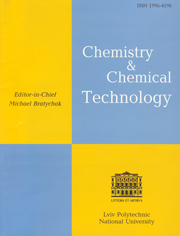Interaction of 5-Substituted 1,4-Naphthoquinones and Amino Thiotriazoles: Reaction Ways and Regioselectivity
| Attachment | Size |
|---|---|
| 186.35 KB |
[1] Tandon V., Maurya H., Mishra N., Shukla P.: Eur. J. Med. Chem., 2009, 44, 3130. https://doi.org/10.1016/j.ejmech.2009.03.006
[2] Husain A., Naseer M., Sarafroz M.: Acta Pol. Pharm. Drug Res., 2009, 66, 135.
[3] Schenone S., Brullo C., Bruno O. et al.: Bioorg. Med. Chem., 2006, 14, 1698. https://doi.org/10.1016/j.bmc.2005.10.064
[4] Dogan H., Duran A., Rollas S. et al.: Bioorg. Med. Chem., 2002, 10, 2893. https://doi.org/10.1016/S0968-0896(02)00143-8
[5] Kritsanida M., Mouroutsou A., Marakos P. et al.: IL Farmaco 2002, 57, 253. https://doi.org/10.1016/S0014-827X(01)01189-2
[6] Holla B., Poojary K., Rao B., Shivananda M.: Eur. J. Med. Chem., 2002, 37, 511. https://doi.org/10.1016/S0223-5234(02)01358-2
[7] Kalluraya B., Sreenivasa S.: IL Farmaco 1998, 53, 399. https://doi.org/10.1016/S0014-827X(98)00037-8
[8] Shakh Y., Romanenko I., Slesarchuk M. et al.: Indian J Pharm Sci 2017, 79, 650. https://doi.org/10.4172/pharmaceutical-sciences.1000275
[9] Polovkovych S., Dumanska Yu., Syngaevsky V. et al.: Res. J. Pharm. Biol. Chem. Sci., 2016, 7, 2125.
[10] Siwek A., Wujec M., Wawrzycka-Gorczyca I. et al.: Heteroatom. Chem., 2008, 19, 337. https://doi.org/10.1002/hc.20433
[11] Russo F., Romeo G., Santagati N. et al.: Eur. J. Med. Chem., 1994, 29, 569. https://doi.org/10.1016/0223-5234(94)90149-X
[12] Russo F., Santagati M.: Farmaco Ed. Sci. 1976, 31, 41.
[13] Lozynskyi A., Zimenkovsky B., Karkhut A. et al.: Tetrahedron Lett., 2016, 57, 3318. https://doi.org/10.1016/j.tetlet.2016.06.060
[14] Contreras R., Fuentealba P., Galvan M., Perez P.: Chem. Phys. Lett., 1999, 304, 405. https://doi.org/10.1016/S0009-2614(99)00325-5
[15] Chamorro E., Perez P.: Chem. Phys., 2005, 123, 114107.
[16] Bochevarov D.: Int. J. Quantum Chem., 2013, 113, 2110. https://doi.org/10.1002/qua.24481










